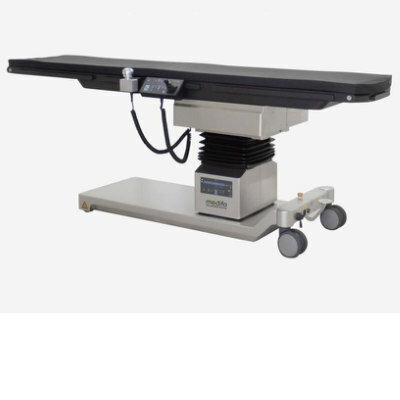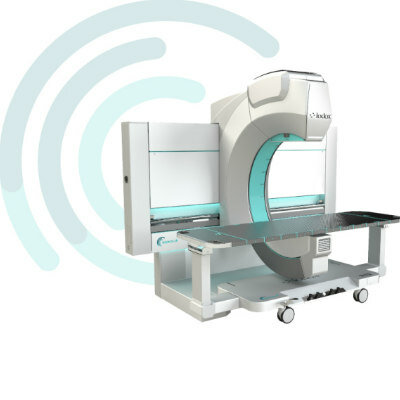SymphonyAI Acquires TeraRecon
|
By MedImaging International staff writers Posted on 01 Apr 2020 |

Illustration
SymphonyAI Group (Los Altos, CA, USA), an operating group of leading business-to-business artificial intelligence (AI) companies, has acquired TeraRecon (Durham, NC, USA), an advanced visualization and AI solution provider for medical imaging.
SymphonyAI Group focuses on delivering next-generation AI solutions for transforming the enterprise. SymphonyAI Group addresses use cases in healthcare and life sciences, retail and CPG, industrial manufacturing, energy, oil & gas, media and entertainment, defense, and financial services. TeraRecon offers medical advanced visualization and AI solutions and has developed sophisticated healthcare-focused AI platform solutions. Used by over 900 health systems globally, TeraRecon’s solutions provide radiologists and other highly specialized physicians with the software tools they need to quickly visualize and extract critical clinical data from medical images.
As SymphonyAI Group’s seventh portfolio company, TeraRecon has a charter to establish a new portfolio of healthcare AI solutions focused on medical imaging. Using its newly-patented AI and platform technology, TeraRecon will continue to focus on expanding its open platform for advanced visualization and AI-driven solutions. TeraRecon will accelerate the use of AI in other clinical specialties, including neurology and oncology, in addition to its market-leading solutions in radiology, cardiology, and vascular surgery.
SymphonyAI Group will invest in infrastructure and key initiatives to rapidly produce new advancements and offerings through TeraRecon’s industry-leading engineering and product teams. TeraRecon will operate as an independent portfolio company in the SymphonyAI Group. Synergies with TeraRecon technologies will complement the precision oncology offerings of portfolio company Concerto HealthAI.
“In just a few years, our company has not only transformed the realm of advanced visualization with artificial intelligence but also our entire industry,” said Jeff Sorenson, president and CEO of TeraRecon. “Now with the backing of SymphonyAI Group and the recent recognition of two powerful patents, TeraRecon can think bigger and work faster than ever before. Having been chosen for such an impressive and selective portfolio is truly an honor, and an ideal outcome for our employees, customers, and stockholders.”
“The SymphonyAI Group mission is to use AI to transform the enterprise. We accelerate high-value AI solutions to market to meet the needs of specific vertical industry use cases,” said Dr. Romesh Wadhwani, founder and CEO of SymphonyAI Group. “TeraRecon has demonstrated the value AI can play in the medical imaging market. We believe that TeraRecon AI technology can continue to deliver unprecedented benefits to doctors and patients and expand into new areas of the healthcare enterprise.”
“Artificial intelligence in medical imaging is expected to deliver several breakthroughs spanning a wide range of clinical areas and modalities,” said Vibhor Rastogi, investment partner at SymphonyAI Group. “With the acquisition of TeraRecon, SymphonyAI Group is bolstering its portfolio of AI-enabled enterprise solutions for the healthcare and life sciences industries. We are committed to leveraging AI to deliver breakthrough therapies and care delivery models.”
Related Links:
SymphonyAI Group
TeraRecon
SymphonyAI Group focuses on delivering next-generation AI solutions for transforming the enterprise. SymphonyAI Group addresses use cases in healthcare and life sciences, retail and CPG, industrial manufacturing, energy, oil & gas, media and entertainment, defense, and financial services. TeraRecon offers medical advanced visualization and AI solutions and has developed sophisticated healthcare-focused AI platform solutions. Used by over 900 health systems globally, TeraRecon’s solutions provide radiologists and other highly specialized physicians with the software tools they need to quickly visualize and extract critical clinical data from medical images.
As SymphonyAI Group’s seventh portfolio company, TeraRecon has a charter to establish a new portfolio of healthcare AI solutions focused on medical imaging. Using its newly-patented AI and platform technology, TeraRecon will continue to focus on expanding its open platform for advanced visualization and AI-driven solutions. TeraRecon will accelerate the use of AI in other clinical specialties, including neurology and oncology, in addition to its market-leading solutions in radiology, cardiology, and vascular surgery.
SymphonyAI Group will invest in infrastructure and key initiatives to rapidly produce new advancements and offerings through TeraRecon’s industry-leading engineering and product teams. TeraRecon will operate as an independent portfolio company in the SymphonyAI Group. Synergies with TeraRecon technologies will complement the precision oncology offerings of portfolio company Concerto HealthAI.
“In just a few years, our company has not only transformed the realm of advanced visualization with artificial intelligence but also our entire industry,” said Jeff Sorenson, president and CEO of TeraRecon. “Now with the backing of SymphonyAI Group and the recent recognition of two powerful patents, TeraRecon can think bigger and work faster than ever before. Having been chosen for such an impressive and selective portfolio is truly an honor, and an ideal outcome for our employees, customers, and stockholders.”
“The SymphonyAI Group mission is to use AI to transform the enterprise. We accelerate high-value AI solutions to market to meet the needs of specific vertical industry use cases,” said Dr. Romesh Wadhwani, founder and CEO of SymphonyAI Group. “TeraRecon has demonstrated the value AI can play in the medical imaging market. We believe that TeraRecon AI technology can continue to deliver unprecedented benefits to doctors and patients and expand into new areas of the healthcare enterprise.”
“Artificial intelligence in medical imaging is expected to deliver several breakthroughs spanning a wide range of clinical areas and modalities,” said Vibhor Rastogi, investment partner at SymphonyAI Group. “With the acquisition of TeraRecon, SymphonyAI Group is bolstering its portfolio of AI-enabled enterprise solutions for the healthcare and life sciences industries. We are committed to leveraging AI to deliver breakthrough therapies and care delivery models.”
Related Links:
SymphonyAI Group
TeraRecon
Latest Industry News News
- Bayer and Google Partner on New AI Product for Radiologists
- Samsung and Bracco Enter Into New Diagnostic Ultrasound Technology Agreement
- IBA Acquires Radcal to Expand Medical Imaging Quality Assurance Offering
- International Societies Suggest Key Considerations for AI Radiology Tools
- Samsung's X-Ray Devices to Be Powered by Lunit AI Solutions for Advanced Chest Screening
- Canon Medical and Olympus Collaborate on Endoscopic Ultrasound Systems
- GE HealthCare Acquires AI Imaging Analysis Company MIM Software
- First Ever International Criteria Lays Foundation for Improved Diagnostic Imaging of Brain Tumors
- RSNA Unveils 10 Most Cited Radiology Studies of 2023
- RSNA 2023 Technical Exhibits to Offer Innovations in AI, 3D Printing and More
- AI Medical Imaging Products to Increase Five-Fold by 2035, Finds Study
- RSNA 2023 Technical Exhibits to Highlight Latest Medical Imaging Innovations
- AI-Powered Technologies to Aid Interpretation of X-Ray and MRI Images for Improved Disease Diagnosis
- Hologic and Bayer Partner to Improve Mammography Imaging
- Global Fixed and Mobile C-Arms Market Driven by Increasing Surgical Procedures
- Global Contrast Enhanced Ultrasound Market Driven by Demand for Early Detection of Chronic Diseases
Channels
Radiography
view channel
Novel Breast Imaging System Proves As Effective As Mammography
Breast cancer remains the most frequently diagnosed cancer among women. It is projected that one in eight women will be diagnosed with breast cancer during her lifetime, and one in 42 women who turn 50... Read more
AI Assistance Improves Breast-Cancer Screening by Reducing False Positives
Radiologists typically detect one case of cancer for every 200 mammograms reviewed. However, these evaluations often result in false positives, leading to unnecessary patient recalls for additional testing,... Read moreMRI
view channel
PET/MRI Improves Diagnostic Accuracy for Prostate Cancer Patients
The Prostate Imaging Reporting and Data System (PI-RADS) is a five-point scale to assess potential prostate cancer in MR images. PI-RADS category 3 which offers an unclear suggestion of clinically significant... Read more
Next Generation MR-Guided Focused Ultrasound Ushers In Future of Incisionless Neurosurgery
Essential tremor, often called familial, idiopathic, or benign tremor, leads to uncontrollable shaking that significantly affects a person’s life. When traditional medications do not alleviate symptoms,... Read more
Two-Part MRI Scan Detects Prostate Cancer More Quickly without Compromising Diagnostic Quality
Prostate cancer ranks as the most prevalent cancer among men. Over the last decade, the introduction of MRI scans has significantly transformed the diagnosis process, marking the most substantial advancement... Read moreUltrasound
view channel
Deep Learning Advances Super-Resolution Ultrasound Imaging
Ultrasound localization microscopy (ULM) is an advanced imaging technique that offers high-resolution visualization of microvascular structures. It employs microbubbles, FDA-approved contrast agents, injected... Read more
Novel Ultrasound-Launched Targeted Nanoparticle Eliminates Biofilm and Bacterial Infection
Biofilms, formed by bacteria aggregating into dense communities for protection against harsh environmental conditions, are a significant contributor to various infectious diseases. Biofilms frequently... Read moreNuclear Medicine
view channel
New SPECT/CT Technique Could Change Imaging Practices and Increase Patient Access
The development of lead-212 (212Pb)-PSMA–based targeted alpha therapy (TAT) is garnering significant interest in treating patients with metastatic castration-resistant prostate cancer. The imaging of 212Pb,... Read moreNew Radiotheranostic System Detects and Treats Ovarian Cancer Noninvasively
Ovarian cancer is the most lethal gynecological cancer, with less than a 30% five-year survival rate for those diagnosed in late stages. Despite surgery and platinum-based chemotherapy being the standard... Read more
AI System Automatically and Reliably Detects Cardiac Amyloidosis Using Scintigraphy Imaging
Cardiac amyloidosis, a condition characterized by the buildup of abnormal protein deposits (amyloids) in the heart muscle, severely affects heart function and can lead to heart failure or death without... Read moreGeneral/Advanced Imaging
view channel
New AI Method Captures Uncertainty in Medical Images
In the field of biomedicine, segmentation is the process of annotating pixels from an important structure in medical images, such as organs or cells. Artificial Intelligence (AI) models are utilized to... Read more.jpg)
CT Coronary Angiography Reduces Need for Invasive Tests to Diagnose Coronary Artery Disease
Coronary artery disease (CAD), one of the leading causes of death worldwide, involves the narrowing of coronary arteries due to atherosclerosis, resulting in insufficient blood flow to the heart muscle.... Read more
Novel Blood Test Could Reduce Need for PET Imaging of Patients with Alzheimer’s
Alzheimer's disease (AD), a condition marked by cognitive decline and the presence of beta-amyloid (Aβ) plaques and neurofibrillary tangles in the brain, poses diagnostic challenges. Amyloid positron emission... Read more.jpg)
CT-Based Deep Learning Algorithm Accurately Differentiates Benign From Malignant Vertebral Fractures
The rise in the aging population is expected to result in a corresponding increase in the prevalence of vertebral fractures which can cause back pain or neurologic compromise, leading to impaired function... Read moreImaging IT
view channel
New Google Cloud Medical Imaging Suite Makes Imaging Healthcare Data More Accessible
Medical imaging is a critical tool used to diagnose patients, and there are billions of medical images scanned globally each year. Imaging data accounts for about 90% of all healthcare data1 and, until... Read more



















